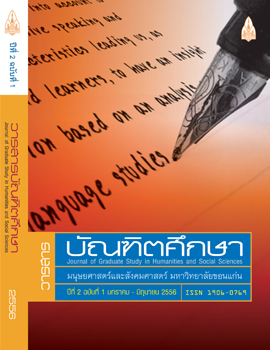การออกเสียงพยัญชนะท้าย (l) และ (s) ในคำยืมภาษาอังกฤษในภาษาไทยมาตรฐานของชุมชนหลังมหาวิทยาลัยขอนแก่น ตามวัจนลีลาและอายุของผู้พูด
บทคัดย่อ
งานวิจัยนี้มุ่งศึกษาการออกเสียงพยัญชนะท้าย (s) และ (l) ในคำยืมภาษาอังกฤษในภาษาไทย ตามตัวแปรทางสังคม 2 ประการ ได้แก่ วัจนลีลาและอายุ เพื่อตอบคำถามว่าตัวแปรวัจนลีลาและอายุมีผลต่อการออกเสียงพยัญชนะท้าย (s) และ (l) หรือไม่ อย่างไร โดยเก็บข้อมูลจากผู้บอกภาษาซึ่งเป็นคนที่อาศัยอยู่ในชุมชนบ้านโนนม่วง ชุมชนหลังมหาวิทยาลัยขอนแก่น เพศหญิง จำนวน 40 คน แบ่งเป็นกลุ่มอายุ 15-29 ปี, 30-34 ปี, 45-49 ปี, และ 60-80 ปีซึ่งเป็นตัวแทนของคนรุ่นใหม่ คนรุ่นค่อนข้างใหม่ คนรุ่นค่อนข้างเก่า และคนรุ่นเก่า ตามลำดับ โดยศึกษาวัจนลีลาการสัมภาษณ์ การอ่านข้อความ และการอ่านรายการคำ ซึ่งแสดงถึงวัจนลีลาที่เป็นทางการน้อยไปหามาก ผู้วิจัยมีสมมติฐานว่า ผู้บอกภาษาทุกกลุ่มมีการออกเสียงพยัญชนะท้าย (s) และ (l) มากขึ้นในวัจนลีลาที่เป็นทางการมากขึ้น และมีการออกเสียงพยัญชนะท้าย (s) และ (l) มากขึ้นตามกลุ่มอายุของผู้บอกภาษาที่น้อยลง ผลการวิเคราะห์แสดงให้เห็นว่าเป็นไปตามสมมติฐานบางส่วน กล่าวคือ ผู้บอกภาษาซึ่งเป็นกลุ่มคนรุ่นใหม่มีการออกเสีย [s] มากที่สุดในวัจนลีลาการสัมภาษณ์ รองลงมาเป็นกลุ่มคนรุ่นค่อนข้างใหม่ กลุ่มคนรุ่นค่อนข้างเก่า และกลุ่มคนรุ่นเก่า ตามลำดับ เช่นเดียวกับวัจนลีลาการอ่านข้อความและวัจนลีลาการอ่านเป็นคำ ส่วนการออกเสียงพยัญชนะท้าย (l) ซึ่งมีเสียงเป็นหน่วยเสียงข้างลิ้น [l] พบว่า มีการออกเสียงน้อยมาก กล่าวคือ ในวัจนลีลาการสัมภาษณ์ พบการออกเสียง [l] ในกลุ่มคนรุ่นใหม่ ส่วนในวัจนลีลาการอ่านข้อความและวัจนลีลาการอ่านเป็นคำ พบการออกเสียง [l] ในกลุ่มคนรุ่นใหม่และกลุ่มคนรุ่นค่อนข้างใหม่เท่ นั้น งานวิจัยชิ้นนี้สรุปได้ว่าการออกเสียงพยัญชนะท้าย (s) มีการแปรไปตามวัจนลีลาแล อายุ เสียง [s] เป็นเสียงที่ยืมจากภาษาอังกฤษ ฉะนั้นจึงสามารถทำนายได้ว่า คนในชุมชนนี้จะมีการออกเสียง [s] ในพยัญชนะท้ายในคำยืมภาษาอังกฤษในภาษาไทยกันในวงกว้างและมีการใช้ในชีวิตประจำวันมากขึ้น ส่วนการออกเสียงพยัญชนะท้าย (l) เป็นเพียงเสียงที่ไม่นิยมใช้ไม่ได้เป็นเสียงที่ยืมมาจากภาษาอังกฤษและไม่มีอิทธิพลต่อการออกเสียงในคำยืมของคนในชุมชนหลังมหาวิทยาลัยขอนแก่น
Age and stylistic variation of final (s), (l) in English loan words in Thai spoken by the community behind Khon Kaen University
The research aims to analyse English loan word in Thai and 2 social variations which are stylistic and age in order to answer the question whether and how those stylistic and age variation affect final consonant pronunciation (s) (l). The data were collected from female participants who live in Baan Non Muang, community behind Khon Kaen University divided into age group of 15-29, 30-34 and 60-80. Those group of age are the representative of new generation, rather new generation, rather old generation and old generation respectively. I study interview, passage reading and word list stylistic which represent most formal style to least formal style. My hypothesis is that the participant will show the more pronounce final consonant (s) and (l) in the more formal stylistic Moreover, the participants will pronounce final consonant (s) (l) follow the lower age group. The result of analysis show that the finding follow some part of hypothesis namely the group which pronounce [s] most in interview stylistic are the new generation, rather new generation, rather old generation and old generation respectively similar with passage reading and word list style. For the pronunciation of final consonant (l) which are the sound of lateral [l], the finding show that there are few pronunciation. That is to say there are the pronunciation of [l] in new generation group for interview stylistic whereas in passage reading and word list stylistic, there are the pronunciation of [l] in only new and rather new generation group. This research can be concluded that the pronunciation of final consonant (s) varies to stylistic and age. [s] is the sound which is loan from English. So, it can be predicted that this community will pronounce final consonant [s] loan word in Thai in wide area and will use this sound more in daily life. For the pronunciation of (l), it is only the sound which is not famous in use and not borrowed from English so that this sound does not affect the loan word pronunciation in the community behind Khon Kaen University.







